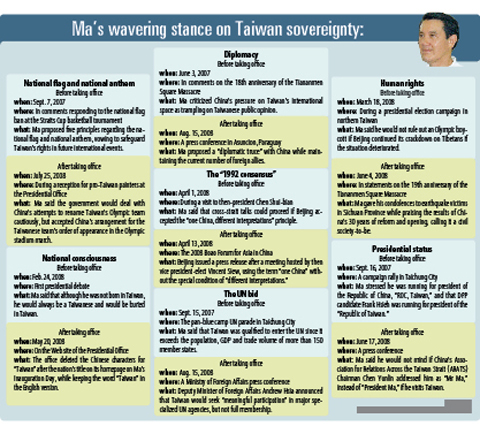President Ma Ying-jeou (馬英九) gave people unrealistic expectations with his presidential campaign slogan “Ma will turn things around right away” (馬上好), and has failed to improve the country’s economy despite his efforts to fulfill campaign promises following his inauguration on May 20, analysts said.
“His campaign slogans were too dramatic, and now he blames the global economy when failing to improve the situation. Didn’t he know the global economy was heading for recession when he made his promises?” said Shih Cheng-feng (施正鋒), dean of National Dong Hwa University’s College of Indigenous Studies, referring to Ma’s prominent campaign slogans — “Ma will turn things around right away” and “We are ready!”
The two slogans were believed to be a factor behind Ma’s decisive victory in the March presidential election, as they satisfied the public’s desire for a better economy.

Ma had accused the former Democratic Progressive Party (DPP) government of retarding economic growth because of its conservative cross-strait policy, and promised to boost the nation’s economy through his “i-Taiwan 12 construction projects” and “6-3-3” economic platforms.
The Council for Economic Planning and Development and the Council of Labor Affairs acknowledged that it would be difficult to reach Ma’s “6-3-3” goals — an annual economic growth rate of 6 percent, annual per capita income of US$30,000 by 2016, and an unemployment rate of less than 3 percent per year.
The Directorate-General of Budget, Accounting and Statistics earlier this month lowered its GDP growth forecast for this year from 4.78 percent to 4.3 percent.
Tu Jenn-hwa (杜震華), an associate professor at National Taiwan University’s Graduate Institute of National Development, expressed pessimism about the Ma administration’s ability to fulfill the “633” economic promise within the next four years.
“The possibility of achieving the ‘6-3-3’ promise is slim because of the global economic slowdown and inflation. The picture he drew was too ambitious, and it’s almost impossible to realize such a bold promise in his four-year term,” he said.
Ma’s administration has blamed its failure to fulfill economic promises on the global slowdown, while pinning its hopes on opening the economy to China to achieve its GDP goal.
But Tu said Ma would fail to lower the unemployment rate to less than 3 percent unless he can create 100,000 new jobs, and such a goal would be extremely difficult to achieve even if the government relaxed the investment cap on China and managed to bring more Chinese tourists to Taiwan.
Commodity and utility price increases and a poor stock market performance also added to people’s economic anxieties, causing Ma’s popularity to decline sharply.
The Ma administration prided itself on carrying out Ma’s campaign promise last month by implementing cross-strait weekend charter flights and welcoming a 600-member inaugural Chinese tour group on July 4.
The cross-strait weekend charter flights were to bring in up to 3,000 Chinese tourists per day in the initial stage, with the number increasing to 10,000 per day within four years, creating NT$50 billion (US$1.6 billion) in annual revenue for the tourism industry, Ma had pledged.
Statistics from the Tourism Bureau, however, show that the actual number of Chinese visitors amounts to less than 300 per day on average, with only 27 of the 198 qualified hotels around the country receiving Chinese tourists.
“He fulfilled only part of his cross-strait campaign platform, and we haven’t seen any signs that he is ready to carry out the rest. Besides, opening up the country to Chinese tourists without a strategy won’t help the economy,” said Tung Li-wen (董立文), a cross-strait expert and professor at the Central Police University.
Although cross-strait charter flights were implemented, cargo charter flights, which are urgently needed by Taiwan and its industries, were left out by Ma’s administration, he said.
The Ma administration relaxed several restrictions on China-related trade issues, such as lifting the 40 percent cap on China-bound investment, allowing overseas companies with Chinese capital to list on the local stock market and allowing Chinese qualified domestic institutional investors (QDIIs) to invest in the stock and futures markets on a case-by-case basis.
Days after assuming office, the Cabinet sparked widespread complaints from the public by abruptly and sharply raising fuel prices. Commodity prices, on the other hand, increased 3.74 percent from 1.8 percent last year.
The TAIEX’s performance, which plunged to below 7,000 points last month, also fell short of Ma’s promise that his administration would boost the stock market beyond 10,000 points.
Surveys have shown Ma’s popularity dropped significantly over the past two months as a result of his failure to lead the country out of economic hardship.
A DPP survey conducted on the eve of Ma’s 100th day in office found his approval rating had plummeted to 36.9 percent from nearly 55 percent in May, with his disapproval rating increasing from 32 percent in May to 57 percent.
Another poll from China Credit Information Services Ltd on Aug. 20 found that only 15 percent of corporate managers from the nation’s top 500 corporations were satisfied with Ma’s performance.
Ma has acknowledged public frustration with the current economic hardship, and urged people to be patient.
“I feel the people’s pain, and my administration will take people’s anger seriously, rather than dodging it,” he said on July 12.
Premier Liu Chao-shiuan (劉兆玄), on the other hand, admitted that the government needed more time.
“The campaign slogan put a lot of pressure on us. I think the slogan should have been ‘Ma will turn things around gradually’ (馬上漸漸好),” he said on June 28.
As the Chinese Nationalist Party (KMT) government struggles to fulfill the heart of Ma’s campaign platform on cross-strait and economic promises, other campaign platforms such as education, culture, labor and environmental protection appear unlikely to be fulfilled in the first year.
Minister of the Council of Labor Affairs Jennifer Wang (王如玄) and Minister of the Interior Liao Liou-yi (廖了以), for example, acknowledged on different occasions that Ma’s promises of two-year maternity leave with 60 percent salary for the first six months and a NT$2 million zero-interest loan for first-time home buyers would not be implemented this year.
The Ma administration’s ability to fulfill its environmental promises was further challenged by environmental activists, as they accused Ma of failing to find a balance between economic development and environmental sustainability.
They also accused Liu of breaking Ma’s campaign promise of exploring alternatives before deciding whether to construct the Suhua Freeway (蘇花高) by announcing last month it would start the construction of part of the proposed freeway.
Environmentalist Li Keng-cheng (李根政), director of the Mercy on the Earth Association, lambasted Ma’s administration, describing Ma’s environmental policy as “contradictory,” and urged the president to re-examine his policies before carrying them out.
“He promised to reduce carbon dioxide emissions, but gave permission for the construction of several coal-fired power plants. He promised land conservation, but supported the reconstruction of the central cross-island highway. It’s ridiculous,” he said.
Li approved of the Ma administration’s efforts to promote energy conservation and carbon reduction by requiring government officials to dress down and drive smaller cars.
Most importantly, however, the president must demand heavily polluting companies meet energy-saving regulations, he said.
“You can’t ask people to reduce their personal carbon footprint, and yet indulge big enterprisesby allowing them to emit huge amounts of waste gas,” Li said.

A strong continental cold air mass is to bring pollutants to Taiwan from tomorrow, the Ministry of Environment said today, as it issued an “orange” air quality alert for most of the country. All of Taiwan except for Hualien and Taitung counties is to be under an “orange” air quality alert tomorrow, indicating air quality that is unhealthy for sensitive groups. In China, areas from Shandong to Shanghai have been enveloped in haze since Saturday, the ministry said in a news release. Yesterday, hourly concentrations of PM2.5 in these areas ranged from 65 to 160 micrograms per cubic meter (mg/m³), and pollutants were

Taiwan’s armed forces have established response protocols for a wide range of sudden contingencies, including the “Wan Chun Plan” to protect the head of state, the Ministry of Defense (MND) said today. After US President Donald Trump on Saturday launched a series of airstrikes in Venezuela and kidnapped Venezuelan President Nicolas Maduro, concerns have been raised as to whether China would launch a similar “decapitation strike” on Taiwan. The armed forces regularly coordinate with relevant agencies and practice drills to ensure preparedness for a wide range of scenarios, Vice Minister of National Defense Hsu Szu-chien (徐斯儉) told reporters before a

EVA Airways on Saturday said that it had suspended a pilot and opened an investigation after he allegedly lost his temper and punched the first officer several times as their plane was taxiing before takeoff at Los Angeles International Airport. According to a report published on Thursday by The Reporter, the incident occurred after the flight’s Malaysian first officer tried to warn the Taiwanese pilot, surnamed Wen (文), that he was taxiing faster than the speed limit of 30 knots (55.6kph). After alerting the pilot several times without response, the first officer manually applied the brakes in accordance with standard operating

The New Taipei City Social Welfare Department on Thursday celebrated Paralympic competitor Chen Tzu-wei (張孜維), who received last year’s national Golden Eagle award for exemplary achievement by Taiwanese with disabilities. Chen, who suffers from childhood-onset muscular dystrophy, did not attend the first award ceremony held by the Ministry of Health and Welfare in November due to illness. Chen was formally presented with the award at the department, where he gave thanks to government workers for supporting his education and livelihood, the department said in a statement. Chen was raised by the Ai-hsin Home for Persons with Disabilities in the city’s Bali District (八里)